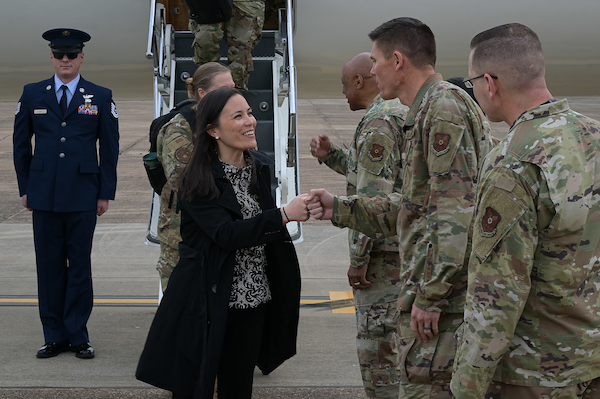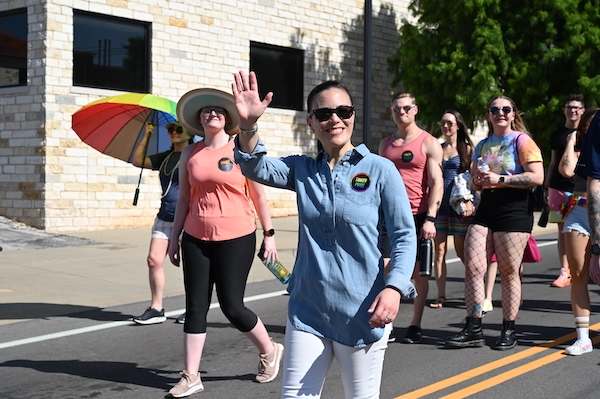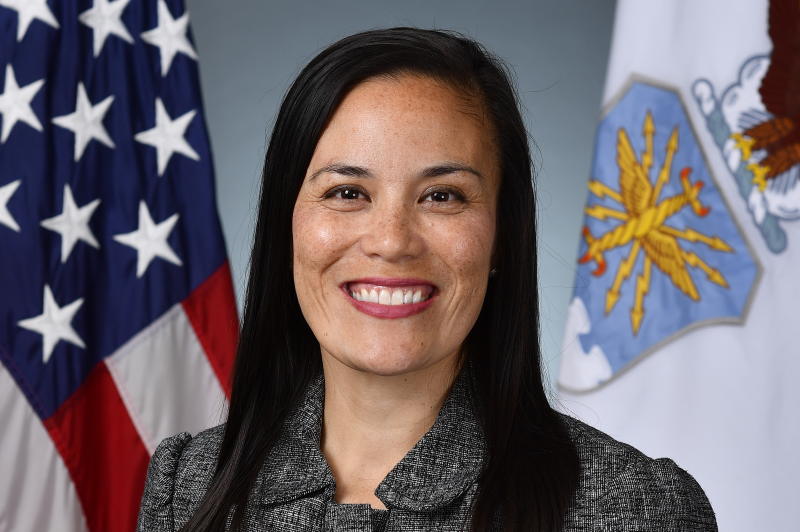Last fall, the U.S. Air Force commemorated the tenth anniversary of the repeal of “Don’t Ask, Don’t Tell” (DADT), a homophobic military policy which forced LGBTQ+ service members to be closeted. As Under Secretary of the Air Force Gina Ortiz Jones approached the Pentagon courtyard for the celebration, she was surprised to see young faces in the crowd.
After all, the event was meant for folks who’d served under DADT. But Jones learned the young service members wanted to be included because the DADT repeal had influenced their decision to serve. That, says Jones, proves the importance of the military removing barriers.
“When we think about the challenges and opportunities we have as a country,” Honorable Jones tells Tagg, “we need to make sure we’re not needlessly closing ourselves off from the nation’s brightest.”
Jones is a former Air Force intelligence officer who built an expansive service career before landing her current role as the second-highest civilian position in the Air Force. Jones is also a lesbian, and she’s known that since before she joined ROTC in college.
Thus, Jones herself is one of those bright stars the nation might have missed out on because DADT existed when she began her public service journey. The fact that she embarked on that path anyway comes down to a familial call to service.
Multifaceted Motivation
For Jones, a first-generation Filipina-American from San Antonio, Texas, her service path began with her mother, Victorina Medenilla Ortiz. Victorina graduated from the top university in the Philippines and worked as a teacher afterward, but to pursue the American dream, she took a job as a domestic helper in the U.S. In America, Victorina gave birth to Jones and another daughter, Christi Ann O. Jones. Happy with her family’s life in the U.S., Victorina constantly reminded her daughters about the importance of giving back to a country that had given them so much. Her daughters both heeded that call, joining the Air Force and the Navy.
“We’re a very proud military family,” says Jones. “I’m very honored to serve.”
The need to pay for college also motivated Jones’s foray into the military. An ROTC scholarship enabled Jones to attend Boston University.
“I knew I was going to serve in some way, and when I earned that ROTC scholarship I really jumped at the shot and was really proud to have earned it,” says Jones.
A Light Dimmed by A Forced Promise
However, there was a down side: For the scholarship, Jones had to sign a “Don’t Ask, Don’t Tell” agreement about keeping secret her homosexuality.
“My opportunity to serve, to die for our country [could go] away,” reflects Jones, “just because, at the time, we didn’t have leaders with enough courage to say that anybody ready and willing to make those sacrifices should have the opportunity to do so.”
Jones chose to serve anyway, but it wasn’t easy. When people discussed weekend activities or dating lives, Jones had to walk on eggshells, answering questions strategically. She constantly feared someone would find out, costing her the scholarship. Through college and three years in the Air Force, Jones didn’t see any indication that DADT would ever be eliminated. So, when her mother was diagnosed with colon cancer, Jones had two reasons to leave the Air Force: to be by her mother’s side, and out of frustration that she’d never get to serve as her authentic self. Jones left the military in 2006.

Yet the Call to Serve Endured
Despite her frustration, Jones remained in public service, spending a required four years as part of the Individual Ready Reserve program and becoming a consultant for military operations in Central and South America, then on a special Africa operations team. She later worked for the Defense Intelligence Agency, then the Office of the U.S. Trade Representative.
In 2017, Jones tried her hand at politics, challenging Republican Will Hurd for his Texas U.S. House of Representatives seat. Jones ultimately lost by a narrow margin, and later lost a 2020 bid against Republican Tony Gonzales. However, Jones soon won a new service opportunity. In 2021, President Joe Biden nominated Jones for Air Force Under Secretary, a position that oversees the approximately 700,000 members of the Air Force airmen and Space Force guardians. She was unanimously confirmed by the Senate last July. Jones was honored to be chosen and saw the opportunity as enticing as the Congressional seat.
“Whether I was running for office or whether I’m in this [Under Secretary] position,” says Jones, “it’s about public service and how I can give back to a country that’s given me and my family so much.”
The Undertaking of Under Secretary
In her first year as Under Secretary, she’s begun tackling the “pacing challenge,” an issue involving China’s aggressive activity in the Indo-Pacific. Additionally, Jones and her team work on recruiting and retaining talented crew and ensuring their well-being and that of their families, which includes addressing issues like sexual and domestic violence.
To that effect, the Air Force leadership team meets every day to assess how they are or can better be supporting service members. Sometimes, policies test that support, like with DADT, the Trump administration’s ban on transgender service members, and now the overturning of Roe v. Wade. Jones says when it comes to responding to such policies, the Air Force does not take a position. However, it can ensure people know about available resources and set service members up to have legal access to necessary resources.
“I’m always looking to make sure we’re […] doing right by our airmen and guardians,” says Jones.

Leading from Experience
Jones carries more weight on her shoulders than an average leader, given her various marginalized identities – first-generation Filipino-American, woman, lesbian. She’s also the first out lesbian and first woman of color to serve as a U.S. under secretary. Jones says each of her identities is equally important to who she is and how far she’s come. However,she notes something unique regarding her queer identity. She says it feels full-circle to have come from having to sign the DADT agreement as a cadet to now being in a position to help airmen and guardians serve without that restriction – to their full potential. But Jones knows making that kind of real impact is about more than just having her new title; she must actually take up leadership space.
“To be able to be at the table and bring a lived experience that is much different than what has been at the table is a true privilege and an honor that I don’t take lightly,” says Jones. “I make sure our conversations are informed by those [traditionally underrepresented] experiences.”
Thinking every day about her own experience and wanting to leave the Air Force better than she found it, Jones is committed to ensuring people can serve at their full potential without worrying about things like hiding their sexual or gender identity. She delights in signs of progress – the repeal of DADT, the Pentagon Pride celebration, the fact that some young service members don’t even know what DADT is. What’s more, the week ahead of Oklahoma City Pride, an all-LGBTQ+ Air Force crew flew an aircraft in honor of the celebration, and for the parade itself, Jones served as a grand marshal and marched alongside Airmen from Tinker Air Force Base.
“I wanted to let our airmen and guardians know I’m proud of them, and I’m proud to serve with them,” says Jones.
But Jones isn’t settling for the fact that that people generally no longer have to make the choice she did between serving and authenticity of self. She says there’s much more work to do, especially regarding protecting trans service members. She’s optimistic, though, about continued progress.
“I truly believe, as someone once said, there’s nothing wrong with our country that can’t be fixed by what’s right with our country,” says Jones. “And again, it’s just a true honor to serve here.”


